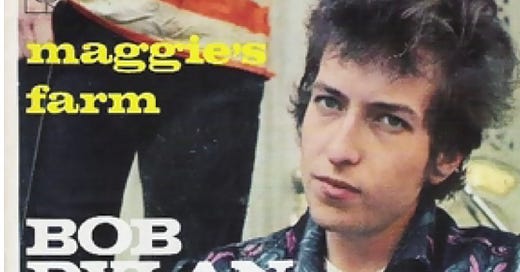Albert Camus posits 3 possible responses to an absurd universe.
One: Physical suicide
Two: Philosophical suicide
(essentially religious belief - something to which will return in a later post, as you might expect if you’re familiar with the twists and turns of Bob’s personal journey)
Three: Revolt!
In the face of the “gentle indifference of the world” Camus asserts that rebellion is the one way in which human beings can create a sense of meaning and create an authentic life in a meaningless universe.
We hear echoes of this in “Maggie’s Farm” a standout track on Bob Dylan’s seminal 1965 album, Bringing It All Back Home, when the song’s lead character exclaims:
“Well, I try my best to be just like I am, but everybody wants you to be just like them” (Maggie's Farm)
This pressure to fit in and conform with society’s values is a recurring theme in Albert Camus writing. This is most obvious in “The Outsider” where Meursault’s inability or unwillingness to show the requisite sadness over the death of his mother is the narrative Camus uses to illustrate the tension between individual authenticity and the norms of society.
Witness the book’s opening statement:
“Mother died today. Or maybe yesterday; I can't be sure.” (The Outsider)
Camus sees conventional shows of sadness and grieving as inauthentic. Required, rather than truly felt.
It is this attitude that sets him apart as ‘an outsider’ from society and ultimately responsible for his guilty verdict. Meursault may have murdered someone, but it’s the lack of remorse over his mother’s death that most impacts the court.
The universe might be meaningless and unjust but
“I revolt, therefore we exist” (The Rebel)
The revolt may be personal, but it also operates at the collective level and offers the possibility of shared human values. When one of us rebels, there is a fallout that impacts the whole of humankind. Rebellion not only establishes and provides meaning to my life, it does the same for humanity as whole.
In short, rebellion is the only real answer to the absurdity and injustice of existence.
All of which brings us back to Bob Dylan and “Maggie’s Farm”.
The song’s central refrain is a declaration of pure rebellion if ever there was one:
“I ain’t gonna work on Maggie’s Farm no more” (Maggie’s Farm)
The farm itself can be seen as a metaphor for the universe, or indeed any system that imposes restrictive rules and denies the individual’s freedom.
In the face of unjust controlling figures (Maggie, her brother, her father, and her mother), and an irrational system, (the farm), the character in the song defiantly expresses his revolt.
As Camus says again in “The Rebel”
"Rebellion is born of the spectacle of irrationality, confronted with an unjust and incomprehensible condition."




